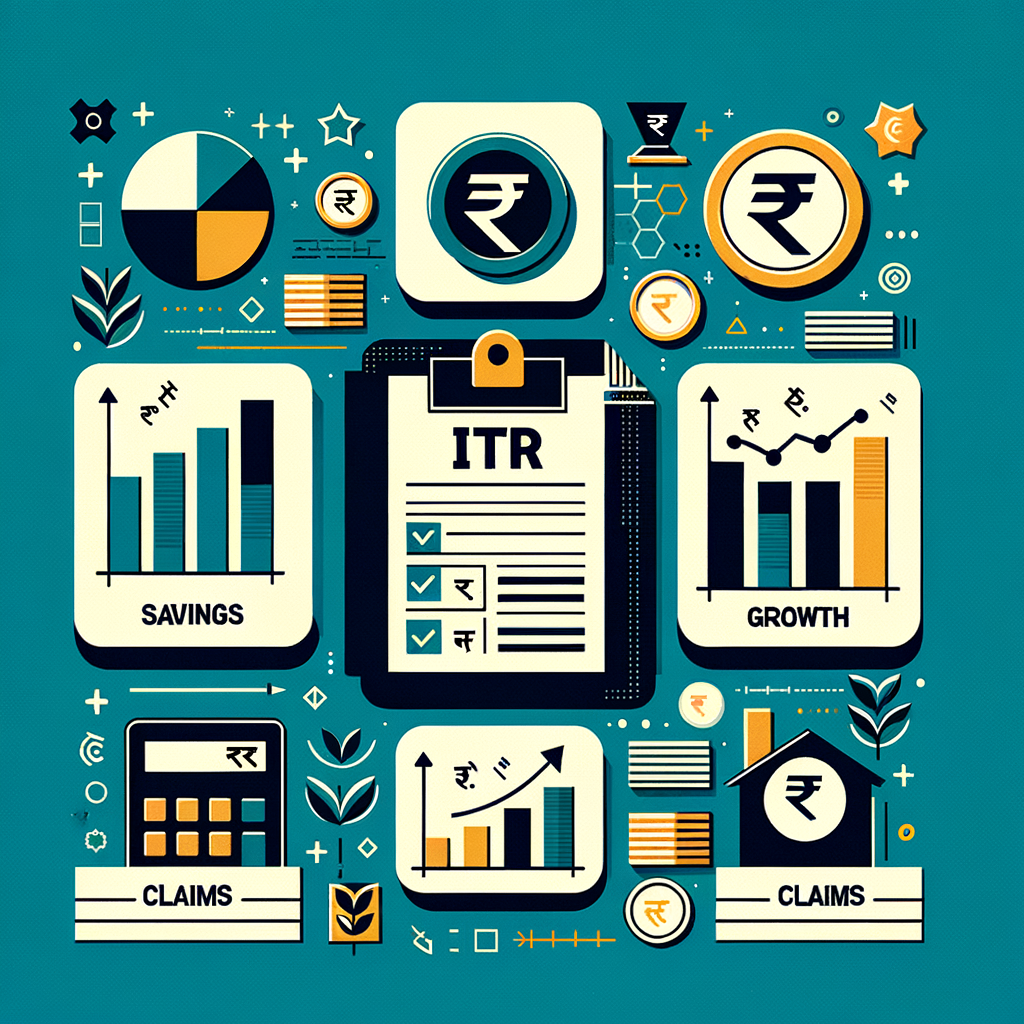Business ITR Filing FY 2024-25: Top Deductions Every Entrepreneur Should Claim
As an entrepreneur, your primary goal is to maximize profitability and grow your venture. While you focus on sales, marketing, and operations, a critical and often underestimated tool for boosting your bottom line is smart tax planning. The annual process of business ITR filing is not just a legal obligation; it’s a strategic opportunity to significantly reduce your tax liability. For the Financial Year 2024-25 (Assessment Year 2025-26), understanding and claiming every eligible deduction is paramount. This guide will serve as your roadmap, breaking down the top tax deductions for entrepreneurs in India. By the end, you’ll be equipped with the knowledge to legally minimize your tax outgo and retain more of your hard-earned capital for business growth. Mastering your business income tax return filing in India starts right here.
Why Your Business ITR Filing Strategy Matters
Before diving into the specific deductions, it’s essential to understand the foundational concepts that govern business taxation in India. A well-thought-out strategy for your ITR filing can be the difference between a hefty tax bill and substantial savings. This involves knowing what constitutes business income, understanding the relevant tax timelines, and recognizing the tangible benefits of staying compliant. Ignoring these basics can lead to missed opportunities and unnecessary financial stress, while mastering them provides a solid foundation for financial health and business scalability.
What is Business Income for Tax Purposes?
For tax purposes, business income refers to any profits and gains earned from carrying on a trade, commerce, manufacturing, or profession during the financial year. This isn’t just your final profit; it’s the gross revenue from which specific, legally allowed expenses can be deducted to arrive at your taxable income. The Income Tax Act requires you to file a specific ITR form based on the nature and scale of your business:
- ITR-3: This form is for individuals and Hindu Undivided Families (HUFs) who have income from “Profits and Gains from Business or Profession.” It’s the standard form for most proprietary businesses and professionals (like doctors, lawyers, and consultants) who maintain regular books of accounts.
- ITR-4 (Sugam): This is a simpler form designed for businesses that have opted for the Presumptive Taxation Scheme under Sections 44AD, 44ADA, or 44AE. For a deep dive into how this works, see our guide on Section 44AD: Presumptive Taxation Scheme for Small Businesses. Under this scheme, income is calculated as a prescribed percentage of your gross turnover, simplifying compliance and reducing the need for extensive bookkeeping.
Differentiating FY 2024-25 and AY 2025-26
Understanding the tax calendar is crucial to avoid confusion. The terms Financial Year (FY) and Assessment Year (AY) are at the core of this calendar.
- Financial Year (FY) 2024-25: This is the period during which you earn your income. It runs from April 1, 2024, to March 31, 2025. All the revenue you generate and the expenses you incur within these 12 months are considered for this period’s tax calculation.
- Assessment Year (AY) 2025-26: This is the year immediately following the financial year, during which your income from the FY is assessed and taxed. It runs from April 1, 2025, to March 31, 2026. So, when you file your return in 2025, you are filing it for the income earned in FY 2024-25.
Key Benefits of Timely Filing
Filing your business ITR on time is more than just avoiding a penalty; it’s a fundamental aspect of good financial governance. The benefits extend far beyond compliance and can have a direct positive impact on your business’s future.
- Avoid Penalties and Legal Issues: Late filing can attract a late fee under Section 234F and interest on the outstanding tax liability under Section 234A. For a complete breakdown of these penalties, refer to our guide on Section 234F: Penalties for Late Filing of Income Tax Returns. Timely filing keeps you in the clear.
- Build a Strong Financial Record: ITRs are official proof of your income. A consistent filing history is essential when applying for business loans, credit cards, or even a visa. Banks and financial institutions rely heavily on your ITRs to assess your creditworthiness.
- Carry Forward Business Losses: If your business incurs a loss in a particular year, you can carry it forward to future years and set it off against future profits, thereby reducing your tax liability in those years. However, this benefit is only available if you file your ITR by the due date.
Essential Deductions Under the Income Tax Act
The backbone of business ITR filing deductions in India lies in Section 37(1) of the Income Tax Act. This provision is a catch-all that allows you to claim any expenditure (which is not capital or personal in nature) laid out “wholly and exclusively for the purposes of the business or profession.” This principle is your guiding light when identifying deductible expenses. These are the common, foundational costs of running a business that you absolutely cannot afford to miss. Properly documenting and claiming these core expenses can lead to significant tax savings.
Office Rent and Utility Expenses
The cost of your workspace is one of the most significant and straightforward deductions. This includes the monthly rent paid for your office, shop, or factory premises. Alongside rent, all associated utility expenses are also fully deductible. This covers electricity bills, water charges, and internet/broadband expenses that are necessary to run your daily operations.
- Actionable Tip for Home Offices: In today’s hybrid work culture, many entrepreneurs operate from a home office. You can claim a portion of your home expenses as a business deduction. The key is to calculate the proportionate share. For example, if you use one room out of a four-room house exclusively for your business, you can claim 25% of your total rent, electricity, and internet bills as a business expense. It is crucial that this area is used exclusively for business to be eligible.
Salaries, Wages, and Employee Welfare
Your team is your biggest asset, and the expenses related to their remuneration and welfare are fully deductible. This category is broad and includes more than just the base salary.
- Salaries and Wages: The gross salary paid to your employees.
- Bonuses and Commissions: Performance-based bonuses or sales commissions paid out during the year.
- Employee Welfare: The employer’s contribution towards the employee’s Provident Fund (PF) and Employee State Insurance (ESI) is a deductible expense. Other staff welfare expenses, like providing meals or refreshments, can also be claimed.
Depreciation on Business Assets (Section 32)
Depreciation is a non-cash expense that allows you to deduct the cost of a business asset over its useful life. You can’t deduct the entire cost of a laptop or a vehicle in the year you buy it. Instead, you claim a percentage of its value each year as it wears out. This is a powerful tool for reducing taxable profit.
- Eligible Assets: Laptops, computers, printers, office furniture, machinery, vehicles (cars, bikes), and even buildings used for the business.
- Depreciation Rates: The rates are prescribed in the Income Tax Rules and vary by asset type. For example, computers and laptops have a higher depreciation rate (40%) compared to furniture (10%) or machinery (15%). You can find the latest official rates on the tax department’s website. For accurate figures, always refer to the official Income Tax India Website.
Repairs, Maintenance, and Insurance
Keeping your business assets in working order involves costs, and these are legitimate deductions. This includes expenses incurred on the repair and maintenance of machinery, office equipment, computers, and furniture. If you own your office building, costs for its upkeep can also be claimed. Crucially, this only applies to revenue expenditure (regular maintenance) and not capital expenditure (which enhances the asset’s value or life, and would be depreciated instead). Furthermore, the premiums paid for insuring your business assets against risks like fire, theft, or natural calamities are fully deductible.
Unlocking Maximum Savings with These Smart Deductions
Beyond the everyday operational costs, several other strategic expenses can significantly lower your tax bill. These are often related to business growth, financing, and professional services. Being aware of these advanced tax deductions for entrepreneurs in India ensures you are maximizing your savings potential and making your tax return work harder for your business. These are often considered some of the best deductions for entrepreneurs in India as they directly relate to expansion and efficiency.
Interest on Business Loans
If you’ve borrowed capital to fund your business operations or purchase assets, the interest paid on that loan is a fully deductible expense. This is a critical deduction that many new entrepreneurs overlook. It doesn’t matter if the loan is a short-term working capital loan from a bank, an overdraft facility, or a long-term loan taken to purchase new machinery or a vehicle for the business. The entire interest component paid during the financial year can be claimed against your business income, reducing your taxable profit directly.
Travel and Conveyance Expenses
All expenses incurred for business-related travel are deductible. This is a broad category that covers both local and out-of-station travel undertaken wholly and exclusively for business purposes.
- What you can claim:
- Local Conveyance: Costs for traveling to client meetings, visiting a supplier, or making bank trips. This includes fuel and maintenance for a business vehicle, or fares for taxis and public transport.
- Outstation Travel: Expenses for business trips to other cities or countries, including flight or train tickets, hotel accommodation, and meals.
- Documentation is Key: For this category, meticulous record-keeping is non-negotiable. Maintain a logbook for vehicle usage, and keep all original tickets, invoices, and receipts for flights, hotels, and local transport.
Marketing, Advertising, and Sales Promotion
Every rupee spent on promoting your business and attracting customers is a deductible expense. In the digital age, this category has expanded significantly and is vital for business growth. Claiming these expenses is a smart way to reduce your tax burden while investing in your company’s future.
- Examples of Deductible Marketing Expenses:
- Fees paid to a digital marketing agency.
- Costs of running ads on Google, Facebook, Instagram, or LinkedIn.
- Website development, domain registration, and hosting fees.
- Printing costs for brochures, pamphlets, and business cards.
- Expenses for participating in trade shows or sponsoring events.
Professional, Legal, and Consultancy Fees
You don’t have to be an expert in everything. The fees you pay to professionals for their services related to your business are fully deductible. This encourages business owners to seek expert advice, ensuring compliance and efficiency.
- What to include:
- Fees paid to a Chartered Accountant for accounting, auditing, and tax filing.
- Legal fees paid to a lawyer for drafting contracts or other legal work.
- Payments to consultants for business strategy, marketing, or technical advice.
- Statutory audit fees and fees for services like GST registration or filing.
Navigating compliance and claiming deductions for business ITR India can be complex. Services like those offered by TaxRobo Online CA Consultation Service can simplify the process and ensure you claim every deduction you’re entitled to.
How to Prepare for a Smooth Tax Filing Season
A successful and stress-free business ITR filing experience depends heavily on year-round preparation. Last-minute scrambling leads to errors, missed deductions, and unnecessary anxiety. By adopting a few good habits, you can ensure that when the tax season arrives, you are well-prepared. Here are some essential ITR filing tips for business owners in India.
Maintain Meticulous Books of Accounts
This is the golden rule of business finance. The legal requirements for this are outlined in our guide, Maintenance of Books of Accounts: Section 128 Explained. Record every single transaction—income and expense—no matter how small. Use a reliable accounting software or even a well-structured spreadsheet to track your finances throughout the year. This not only makes tax filing easier but also gives you a clear picture of your business’s financial health at any given time.
Reconcile Bank Statements with Your Books
On a monthly or quarterly basis, sit down and reconcile your business bank account statements with your books of accounts. This simple practice helps ensure that no income or expense is missed. It also acts as a cross-verification mechanism that is incredibly useful if your records are ever scrutinised by the tax authorities.
Keep All Invoices, Bills, and Receipts Organised
Every deduction you claim must be backed by documentary proof. Maintain a systematic filing system (either physical or digital) for all your purchase invoices, expense receipts, bank statements, and payment vouchers. This documentation is your evidence when claiming deductions for business ITR India. Without it, an expense may be disallowed during an assessment.
Know Your Due Dates
Mark your calendar with the relevant ITR filing due dates to avoid last-minute panic and penalties. While these dates can sometimes be extended by the government, it’s always best to aim for the original deadlines. For AY 2025-26, the general due dates are:
- July 31, 2025: For individuals and businesses whose accounts are not required to be audited.
- October 31, 2025: For companies and businesses whose accounts are required to be audited.
Always verify the exact deadlines for the current year on the official Income Tax e-Filing portal.
Conclusion
Successful business ITR filing is far more than an annual compliance chore; it’s a fundamental financial exercise that directly impacts your profitability. By strategically identifying and claiming all eligible deductions—from office rent and employee salaries to depreciation, marketing spends, and loan interest—you can significantly reduce your taxable income. This translates to lower tax payments and more capital available for reinvestment, innovation, and growth.
The twin pillars of effective tax management for any entrepreneur are diligent bookkeeping and a clear awareness of eligible deductions. Remember, the goal is not tax evasion, but smart and legal tax avoidance. By staying organised throughout the year and understanding the provisions of the Income Tax Act, you empower yourself to make informed financial decisions. Navigating the nuances of business income tax return filing in India can feel overwhelming. Don’t leave your hard-earned money on the table. Contact TaxRobo’s experts today for personalized assistance and ensure you claim every single deduction you rightfully deserve.
FAQs on Business ITR Filing and Deductions
1. Q: What is the difference between ITR-3 and ITR-4?
A: ITR-4 (Sugam) is a simplified return for businesses that have opted for the presumptive taxation scheme under Section 44AD, 44ADA, or 44AE, where income is calculated as a fixed percentage of turnover. ITR-3 is a more detailed form for individuals and HUFs who have income from a proprietary business or profession and do not opt for the presumptive scheme, requiring them to maintain full books of accounts.
2. Q: Can I claim business expenses that were paid in cash?
A: Yes, but with a significant restriction. Under Section 40A(3), any single expense payment made to a person exceeding ₹10,000 in cash on a single day is generally disallowed as a deduction. This rule is in place to promote digital transactions and curb unaccounted cash flow. It is always advisable to use banking channels like cheques, bank transfers, or UPI for business expenses.
3. Q: What happens if I miss the due date for filing my business ITR?
A: Missing the deadline has several negative consequences. You may be liable for a late filing fee under Section 234F, have to pay interest on the unpaid tax amount under Section 234A, and most importantly, you will lose the ability to carry forward certain business losses (except loss from house property and unabsorbed depreciation) to future years.
4. Q: I work a salaried job and have a small side business. How should I file my taxes?
A: You are required to report both sources of income in a single ITR form. Your salary income will be declared under the head “Income from Salary,” and your business income will be declared under “Profits and Gains from Business or Profession.” You would typically need to file ITR-3. You can claim all eligible business-related deductions against your business income, but not against your salary income.



